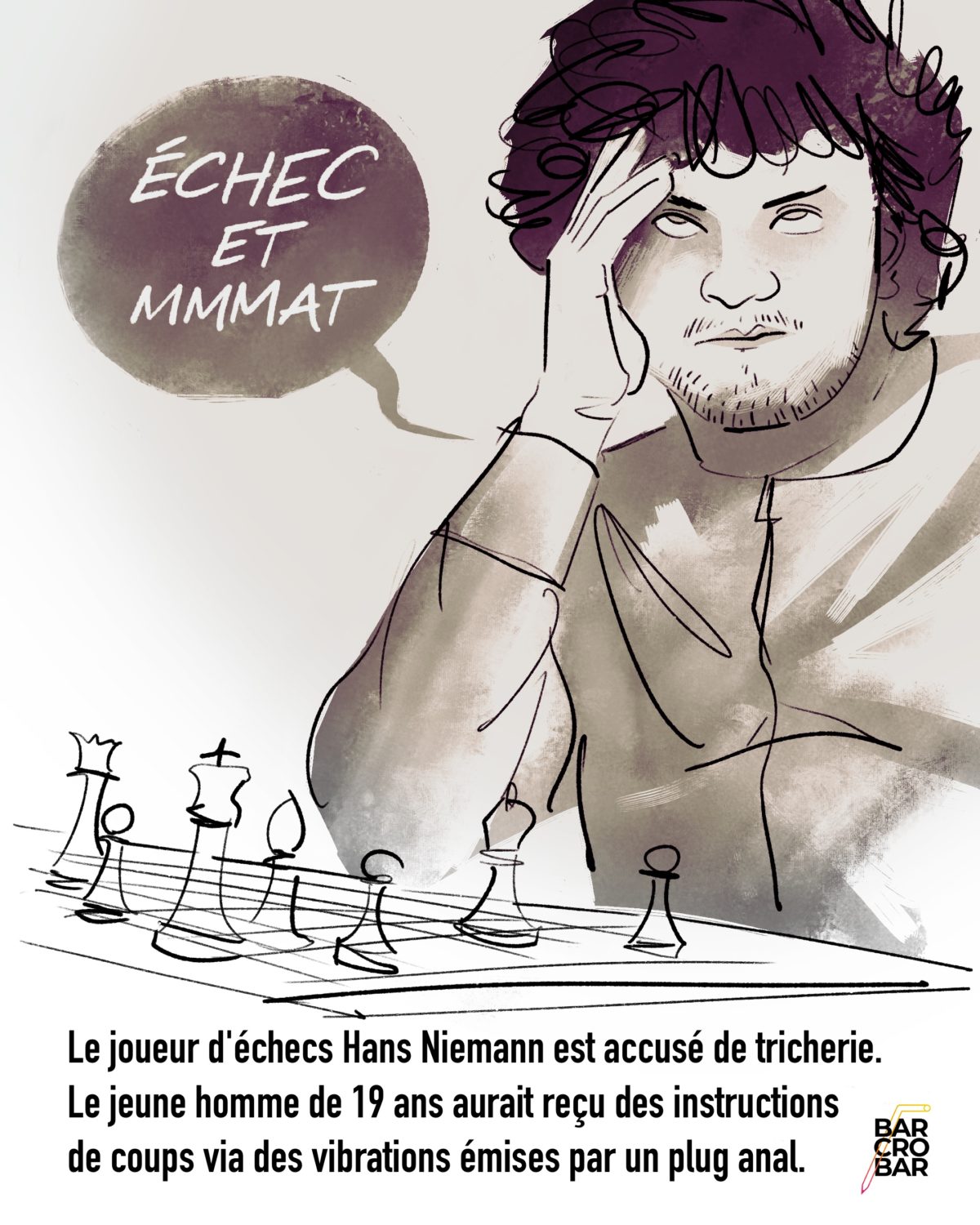On 4 September 2022, during the Sinquefield Cup chess tournament in the United States, the young Hans Niemann won his match against the world champion Magnus Carlsen. Carlsen suffered his first defeat for 53 games. Two weeks later, the two men met again. The match got under way when, suddenly, it was all over: Carlsen gave up. He turned off the camera that was broadcasting his moves, leaving the incredulous spectators with no explanation.
Accusations flew in the following days. Niemann was suspected of cheating: some professional players said they were astonished by his level, which seemed abnormally high given his record. "From the age of 17 to 19, you don't progress as quickly as that," said Eloi Relange, international grandmaster and president of the French Chess Federation. The young American earned his master's title at the age of 17, whereas the 12 other players under the age of 25 who are among the 50 best in the world attained this rank between the ages of 12 and 16.
In the absence of any material evidence, the Internet is full of theories as to the cause of the subterfuge. Rumours start with earpieces, then vibrating soles. Another hypothesis, which at first seemed incongruous, eventually emerged as a perfectly plausible explanation. Niemann is said to have inserted an anal plug before his game, in order to receive instructions via pulsations.
The player defends himself and proclaims his innocence in a way that borders on insolence. "I think Magnus Carlsen is disgusted to have lost to an idiot like me. It's embarrassing for a world champion. I feel bad for him," he declared without batting an eyelid in front of the Saint Louis Chess Club cameras. It's a real scandal.
The chess world was in an uproar. Reactions were swift, particularly from a certain Garry Kasparov, who was highly critical of Carlsen's attitude. In an interview, he said that it was "unacceptable" to leave a tournament in progress, even if there was evidence of cheating.
This speech is all the more resonant when put into perspective with the history of chess. Kasparov is indeed a monument of the discipline: he dominated it for fifteen years. However, if history remembers his name, it is also as the first world champion to have been beaten by a computer. That was 25 years ago.
A day to remember
In May 1997, chess champion Garry Kasparov played his second match against Deep Blue, a supercomputer designed by IBM. In the first encounter, fifteen months earlier, the Russian player had emerged victorious. This new face-off was to take a completely different turn.
During the first set, Kasparov was disturbed by an unusual computer move, the logic of which he did not understand. In the end, however, he won. The second round followed, and Deep Blue proved as unpredictable as ever. The Russian player lost his nerve and conceded the game. At the end of the sixth, he was forced to concede. It was a real thunderclap: for the first time, a world champion was defeated by an artificial intelligence.
Kasparov's reaction to Carlsen's attitude reveals the impact of this defeat on chess. The players were traumatised, and the artificial intelligence appeared invincible. In concrete terms, Deep Blue's victory had repercussions for the sport's economy: during the champion's tournaments following his defeat, sponsors were more reluctant than before to finance him. On the other hand, the indirect publicity from which IBM benefited is estimated at 500 million dollars. In the collective imagination, the computer is the real number one.
I think, therefore I am?
In 2006, world chess champion Vladimir Kramnik lost to a standard desktop computer. From then on, humans had to come to terms with the intellectual superiority of chess machines, and training with the help of algorithms became widespread among professionals. Garry Kasparov himself is considered to be the first person to have studied chess openings in depth using programmes.
Eloi Relange, who was just a promising young player in 1997, explains that the professionals only used computers to check their tactical errors. Today, the best players use artificial intelligence to "come up with ideas that will surprise their opponent", says the now President of the French Chess Federation at La Croix.
The main risk of such practices is that they smooth out the game. Players abandon their creativity to concentrate on more pragmatic assets, such as studying the moves listed. More than talent, it is now the hours invested in learning the different combinations that seem to lead to victory. The paradigms on which the discipline is based are undergoing a radical transformation.
While professionals used to prepare rigorously before their performances, grandmaster Matthew Sadler says that "the amount of stuff there was to remember just exploded" with the advent of the programmes. "The thrill came from using your mind creatively, and working on strategic problem solutions. Not testing each other to see who has the best memory," laments international player Wesley So in the media. The Atlantic.
As professionals rely more and more on rote learning dictated by machines, their autonomy as athletes is diminishing. The outcome of this development seemed logical, and the discipline was soon plagued by a major scourge: cheating. Hans Niemann hasn't invented anything.
To be or not to be
The situation is dauntingly simple. No matter how hard a human being tries, he will always be soundly beaten by a computer programme. Ironically, the same Vladimir Kramnik who was defeated by a computer was accused of cheating with algorithms during the tournament that crowned him world champion a few months before his defeat.
Fraud is on the increase among unscrupulous sportsmen and women. In 2015, Georgian grandmaster Gaioz Nigalidze was caught running programmes on his phone in the toilet during a tournament in Dubai. The International Chess Federation investigated, and the offender was finally banned from competition for three years. This event marked a turning point, as it was the first case in which the Anti-Cheating Committee applied a sanction.
Players are now required to leave their phones in the cloakroom, and competitions begin with searches. Now Hans Niemann has admitted to cheating in online tournaments. According to the website chess.com, which recently published a 72-page report, he "probably" played in more than 100 games on the Internet, some of them with prizes.
Cheating in chess is all the more petty because it is very difficult to identify, especially since the democratisation of online play. It is only exposed during major events, such as the confrontation between Niemann and Carlsen. Top player Kenneth W. Regan explained in an interview this month with LA TimesIt's a fact, however, that youngsters with incredible talent and situations comparable to Hans Niemann's often appear out of nowhere. In most of these cases, their sporting integrity is called into question.
Live and let live
Despite all these upheavals, chess has survived. Fraud does a lot of damage, but it is not the only innovation brought about by computers. First and foremost, they have made learning the game much more accessible, and therefore more democratic.
Artificial intelligence has also opened up new avenues for chess enthusiasts, enabling them to make moves that were once considered too risky. As a result, the possibilities of the game have been broadened and the discipline has evolved. In an interview for Le Time released in 2019, Garry Kasparov says that while his defeat by Deep Blue shocked him at the time, in retrospect he sees it as "a victory for humanity". According to the former champion, the future of mankind lies not behind the machines, but alongside them.
Finally, instinct and talent will always be important in chess. This is borne out by the rapid games, particularly those used to decide between opponents in the event of a tie, during which it is impossible not to make mistakes in view of the imposed timing. Although the programmes indicate the best openings to play, it is still up to the human mind to work out the best strategy based on this move.
According to the website chess.com, only 0.2 per cent of players cheat in online tournaments: a figure much lower than popular belief. The chess community seems particularly keen to revive what used to be the charm of the discipline: the thrill of a duel of the mind, the vertigo of the infinite possibilities allowed by 64 squares, and the creativity expressed on the board as a game that was born so many centuries ago is renewed.
Text by views.fr

